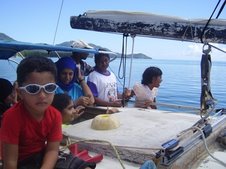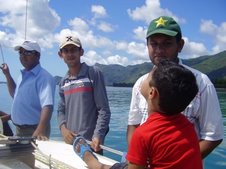Four hours of US-Iran talks produce more questions
At last the ice was broken in the US-Iran relations. On Monday, the two countries' ambassadors in Iraq met face-to-face to discuss Iraq's future. The talks were the first in 28 years after the two countries broke diplomatic relations in the wake of the Iranian people's revolution led by Ayatollah Rohollah Khomeini.
US ambassador Ryan Crocker shook hands with his Iranian counterpart Hassan Kazemi Qumi at the high security Green Zone office of Iraqi Prime Minister Nouri al-Maliki in Baghdad for four hours.
The meeting was businesslike but the undercurrents were hostile though the two countries agreed to discuss nothing but Iraq.
As to who set the agenda for the meeting, both sides claim the credit. The United States said that it was at the request of Washington that the meeting was narrowly confined to the Iraqi situation.
But the Iranians say it was they who set the stage and set the agenda too.
The Iranians say their officials had higher morale and gained the upper hand throughout the meeting.
They say that victory was theirs from the moment the process started. The Iranians say the Americans, caught up in the Iraq quagmire, were sending informal requests through various diplomatic channels for talks but Tehran insisted that they would only respond to an official request.
According to Iranian news reports, the US then submitted such a request through the Swiss embassy in Tehran. Iran then put forward two conditions — a strict focus on Iraq's security and the presence of Iraqi officials as the third party.
In practice, it was Iran that set the agenda, the reports said.
It is clear from the statements of U.S. officials, including the article by Under Secretary of State for Political Affairs Nicholas Burns published in the Boston Review, that the main reasons for the US to talk to Iran were the U.S. entrapment in the quagmire of Iraq and Afghanistan, internal disputes in the U.S. government, Israel's humiliating defeat in its 33-day war against Hezbollah, and other regional and international problems of the United States, the reports said.
That the United States agreed to talk to its arch foe is indicative of the Bush administration's desperation. Last year, the Iraqi Study Group — a bipartisan expert panel — proposed that the Bush administration talk to the Iranians. But the White House was adamant — until the Iranians gave up their nuclear ambitions the Americans would not talk to them. But Monday's meeting shows that the White House now sees wisdom in the study group proposal.
The heat on the Bush administration is really increasing. The anti-war cry is getting stronger and louder in the United States. The administration's military "surge" in Iraq have only exacerbated the crisis with more and more US troops being killed. Last week, the US Congress passed a bill approving funds for the Bush administration's wars in Afghanistan and Iraq, but the passage of the bill came along with caveats. Several Democratic Party members said they favoured an early US troop withdrawal from Iraq.
The Bush administration policy, especially its scant respect for international law and issues such as climate change, has made the United States the most unpopular country in the world followed by Israel. It stands stripped today before the international peace community for the lies it uttered in the build-up to its invasion of Iraq. The weapons of mass destruction which the Bush administration cited as its reason for the invasion were nowhere to be found in Iraq. However much the corporate US media tried to protect the Bush administration and project Bush's war as a just war, the alternate media — especially the internet-based news groups and bloggers — and a handful of independent mainstream journalists have exposed the Bush administration's charade.
When the going got tough in Iraq, the Bush administration wanted excuses. First it blamed Osama bin Laden's Al-Qaeda. The Bush administration named them Al-Qaeda in Iraq. The Iraqi Shiites, who comprise 60 percent of the population, the pro-US Kurds who make up 20 percent and even most Sunni Arabs are not friends of al-Qaeda. Yet the Bush administration was unable to rein in this handful of Sunni Muslim foreign fighters of al Qaeda although it had the support of 2000,000 coalition troops. So it started pointing its finger at Iran.
The US Defence Department has alleged that the Iranian Revolutionary Guards are active in Iraq and supplying armour-penetrating explosive devices that have become a deadly weapon in the hands of the Iraqi resistance forces, be they Shiites or Sunnis.
Iran may or may not be playing a role in fuelling the anti-US insurgency in Iraq. But the reality is that as long as the United States stays in Iraq, it will be a threat to Iran's sovereignty. Iran's rapidly progressing nuclear programme is being viewed by the United States and Israel as a direct threat to them. No one could rule out the possibility of either the United States or Israel or both launching an attack on Iran's nuclear facilities.
Iraq, aware of these realities, does not want their country to be used as a battleground for settling scores. So the Nouri al-Maliki government in Baghdad is a strong advocate of a US-Iran meeting.
Iran has been an opponent of US occupation in Iraq and of late has been calling for a timetable for the withdrawal of occupation troops. Then why should they hold talks? Have the Iranians decided to help the Bush administration in return for some concessions such as a promise not to pursue tough sanctions on Tehran? For four hours they discussed and in the end there was nothing much to tell the media. The two ambassadors who took part in the talks said the talks were positive. US ambassador Crocker said: "As you surely know among diplomats, you don't need a lot of substance to take up a lot of time."
Iranian ambassador Kazemi said Iran had offered to train and equip the Iraqi security forces to create a new military and security structure and to build Iraq's devastated infrastructure.
Iran, being the powerful neighbour of Iraq, is certainly an influential factor in Iraq's politics. It gave tacit support for the United States when the sole superpower invaded Afghanistan first and then Iraq which was under Saddam Hussein, the nemesis of the Iranian regime.
Now that the US has got rid of Saddam and pro-Iranian politicians calling the shots in Iraq, one would expect that Iran obviously wants the US out. Has the Iranians compromised on this oft-stated policy?
Helping the Iraqis to rebuild their country with security for all the Iraqi people is certainly a noble goal, but if the Iranians step in with selfish ends — for instance, forcing the Americans to adopt a soft approach on the Iranian nuclear dispute — to extend a hand to the United States - then they would be doing it against the will of the Iraqi people who clamour for freedom from occupation or the shame of occupation.


















